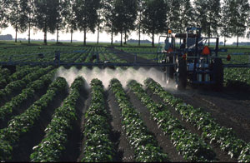
Kickback activity is an essential component of the blight spray programme under what's being described as some the highest blight risk conditions for some years.
"Warm temperatures, humidity and rainfall are combining to present an extremely high risk of blight infection," warns Masstock's technical support manager Malcolm Smith. "Blight pressure in many parts of the country is now as high as it's been for many years," he says.
While he notes that the specific crop threat will be localised according to conditions on a field by field basis, he advises tight seven day spray intervals using robust and reliable products.
With crops approaching or at full stable canopy he recommends that protectants such as Roxam / Electis (mancozeb + zoxamide) or Ranman are alternated with something offering kickback action. He considers that new chemistry such as Valbon (benthiavalicarb-isopropyl + mancozeb) or Infinito (flupicolide + propamocarb) deliver significant advances in blight control over existing products, although he notes that products such as Merlin (chlorothalonil + propamocarb hydrochloride), Curzate (cymoxanil + mancozeb) or Invader (dimethomorph + mancozeb) are further options that have kick back activity. "Kickback action is particularly important where weather conditions have delayed applications and the 7-day interval has been stretched," he says.
"Valbon and Infinito are the new introductions this season and both offer kickback activity to catch any infection that may take hold between sprays, as well as translaminar action to provide additional plant protection. The alternative is to continue with protectants and incorporate the previous best standard in curative control, cymoxanil," he advises.
"Valbon has the edge over some earlier competitors," notes Mr Smith. "It is more rainfast than other treatments and offers several modes of action, 24 hour kickback and a low application rate of active ingredient that reduces the total pesticide loading. Benthiavalicarb is also a new active to potatoes," he explains. In trials, Valbon has been shown to significantly delay the onset of blight into the crop and thus reduces the incidence of tuber blight.
"Do not consider reducing product rates," he adds. "Potato blight is the crop's number one threat and the cost of a robust blight programme is comparatively minor compared to the total cost of growing a potato crop. Only when blight pressure subsides should growers consider extending the spray interval."
